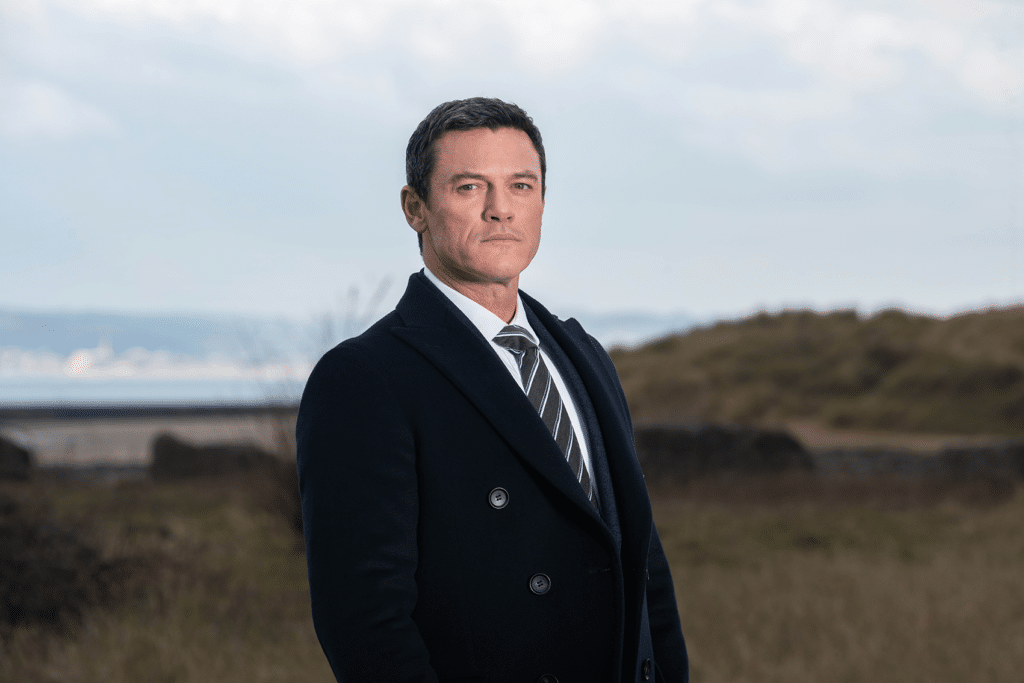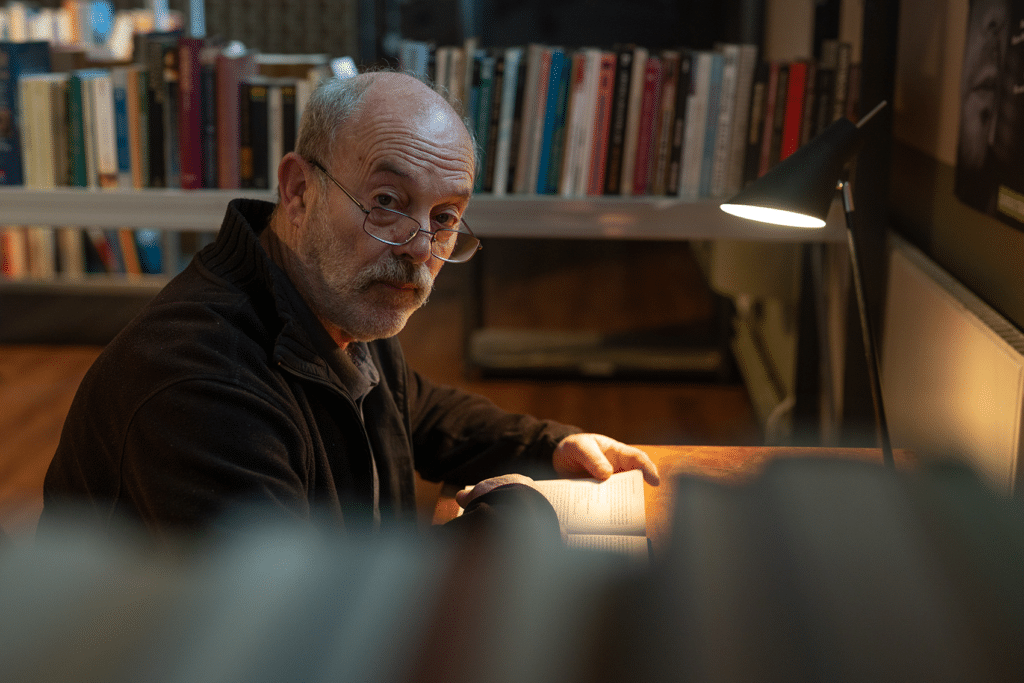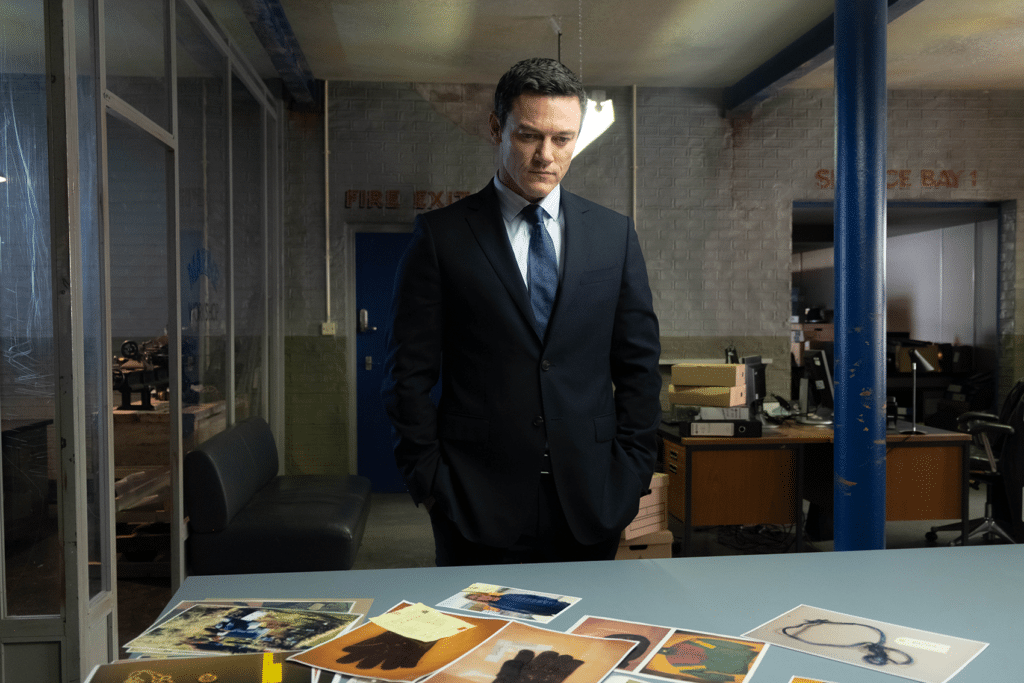Really enjoyed this series. Realistic and not sensationalised. Good acting.
No offence to the real Senior Investigating Officer DCI Steve Wilkins here, but he must have been surprised when he learned that Hollywood star Luke Evans (The Hobbit, Clash of the Titans, Fast & Furious 6) had been cast to play him. The handsome leading man appears as Wilkins in ITV’s adaptation of the true crime book The Pembrokeshire Murders, written by Wilkins and ITV news journalist Jonathan Hill – played here by the slightly less strapping David Fynn from Vanity Fair.
This Wales-set three-parter comes from the makers of Line of Duty and Bodyguard and is produced by the same man behind Welsh crime drama successes Craith/Hidden and Hinterland. Not that you’d know from its style or tone, however. The Pembrokeshire Murders doesn’t have the rapid heartbeat of the Jed Mercurio thrillers or the disturbing gothic tinge of those haunting Welsh noirs.
Instead, this true crime drama occupies a similar televisual space as ITV’s previous efforts Des, A Confession and White House Farm. Tonally it resonates most with Des; there’s even an eerily similar-looking famous actor in the role of the serial killer. Keith Allen isn’t quite the spit for John William Cooper as David Tennant was for Dennis Nilsen, but there’s an uncanny resemblance nonetheless.
As with those three other true crime ITV dramas, The Pembrokeshire Murders is patient, mature TV. It’s smart and classy enough to avoid reconstructing the murders, instead opting for an emphasis on the procedural side. We see the killer here in this opening episode, but only as an angry man rotting away in prison.
The trade-off with these kinds of dramas comes in that desire to be respectful. It’s laudable, but it does result in a notable lack of ‘murder’. Which seems churlish and almost immature to say, but for fans of the genre raised on fiction, this breed of real-life drama can come close to dullness at times.
The ‘action’, although that’s probably not the most accurate word to use, takes place in 2006 – you can tell because of the version of Excel that DCI Wilkins uses and how tiny his mobile phone is. Cooper’s four murders, multiple rapes, assaults and burglaries took place between 1985 and 1998. So we’re firmly in ‘cold case’ territory here.
As such, Evans hasn’t been asked to keep his cardio up for the project, there are no scenes of him running on a Pembrokeshire beach, chasing after the murderer. Instead, this is all about forensic evidence and careful detective work. It’s interesting for true crime fans, but does risk leaving some viewers a little nonplussed. Fans of lively dramas will be left colder than the case Wilkins and his team are tasked with solving here.
There’s a little family ‘drama’ thrown in for good measure, but Wilkins seems like a nice, normal and professional bloke, so the hints at a failed marriage and custody issues feel more like filler material than any real characterisation. We see Evans glumly ironing his own shirts in his meticulous flat and being A Good Dad by watching his son playing football, but only in scenes best used as time to flick the kettle on and grab a handful of the last remaining Quality Streets.
Eagle-eyed viewers will have spotted the rather incongruous apparition of Jim Bowen during one scene, cut in between images of Cooper playing darts in his cell. Those of you that are familiar with the most unusual part of the case will understand why. Cooper appeared on the ITV darts game show Bullseye in 1989, in the middle of his murderous crime spree. As we’ll no doubt learn in the next two parts, ‘Bully’ was actually used to help identify him during the investigation. We look forward to finding out more about that.
We also look forward to seeing more of Allen as Cooper. This opening episode showed glimpses of the Shallow Grave actor as the vicious killer. Parts two and three should allow him to stretch his acting wings and give us a glimpse into the sociopathy of the man that managed – albeit only briefly – to make the beautiful Pembrokeshire coastline ugly.
The Pembrokeshire Murders episode 2 will be shown on Tuesday night at 9pm on ITV1.
Did you tune in for The Pembrokeshire Murders episode 1? Let us know your thoughts in the comments below!
1 Comment
Join the discussion
Please note: Moderation is enabled and may delay your comment being posted. There is no need to resubmit your comment. By posting a comment you are agreeing to the website Terms of Use.
Still catching up on The Pembrokeshire Murders episode 2? Read Steve’s review of episode 1 here.
For a drama that’s snagged a pretty hefty piece of casting in Luke Evans, The Pembrokeshire Murders doesn’t overwork the Pontypool-born 41-year-old. Okay, he’s technically the central character here, but – much as his character Detective Superintendent Steve Wilkins did during his cold case investigation of serial killer John William Cooper – the piece uses everything and everyone at its disposal.
It would have been tempting to shape this three-parter to have been Luke Evans vs. Keith Allen – to make it all about a clash of the famous faces. That’s not how the story played out in real life, though. And truth and realism are the focus here.
More casual viewers might have wanted Tuesday night’s big interview scene to see the imposing figure of Evans and the creepily effective Allen verbally tussling. Calm vs. snarl. The reality is that Wilkins was smart enough to step back and delegate the task to two of his team – a disarmingly friendly bear of a man and a whip-smart woman designed to rattle the misogynistic Cooper.
While we miss the two stars facing off here, we are instead shown an insight into the kinds of psychological techniques that investigators employ when flushing out criminals. Added to the sneaky plot to shake up Cooper with the Wales Tonight appearance, we were given a glimpse into the clever control and handling that sometimes goes on in interview rooms. Again, realism is the goal.
The opening episode’s mood set and player introductions firmly made, Tuesday’s second part allowed The Pembrokeshire Murders to relax and really dig into the grimly fascinating story of John Cooper – and, of course, the Dyfed Powys Police’s doggedly determined mission to prove he was a multiple murderer.
This isn’t a thriller played at a breakneck speed. This is how police forces operate – how violent, narcissistic sociopaths operate. Real life sees far less car chases, shootouts and explosions. The truth of these crimes and investigations sees manipulation, coercion and opportunism on one side and process, procedure and resilience on the other.
Bizarrely, one of the more unusual and interesting repeating themes of this ITV drama is something which, on the face of it, is pretty dull: police budget. It’s made clear to the viewer on more than a few occasions that the team has finite resources. Being a cold case, forensics are vital, but they can only have tests run on a limited number of objects. Finances dictate that. It’s an illuminating side you rarely see that really demonstrates how detectives are often forced to reach for their ‘cuffs with their hands tied.
As this middle episode drew to a close, the case’s most bizarre feature was fully revealed… The May 1989 episode of Bullseye. To develop the case against Cooper, Operation Ottawa needed a picture of the man in 1989. They went one better and tracked down a full episode of the killer throwing arrows on the much-watched TV darts show. Cooper’s brazen appearance and arrogance would prove pivotal in the case against him.
So far The Pembrokeshire Murders has been intriguing, patient and confident television. It seems that the watching public agrees too. Monday night’s debut attracted 6.3 million pairs of eyes, the best opening for an ITV drama in five years. Alright, so the lockdown might account for some of that. But we have to say… Thank goodness for quality new crime drama like this while we’re all trapped inside.
Did you watch The Pembrokeshire Murders episode 2? Let us know your thoughts in the comments below…
Join the discussion
Please note: Moderation is enabled and may delay your comment being posted. There is no need to resubmit your comment. By posting a comment you are agreeing to the website Terms of Use.
Still catching up on The Pembrokeshire Murders episode 3? Read Steve’s review of episode 2 here.
‘Bad things happen around bad men…’
That’s what Welsh serial killer John William Cooper’s son Andrew says at one point in this third and final episode of true-life ITV crime drama The Pembrokeshire Murders. And he’s not wrong.
The younger Cooper is explaining how it’s possible that his father’s release from prison can coincide so precisely with his mother’s fatal heart attack. He’s talking to Detective Steve Wilkins (Luke Evans) who, understandably, suspects foul play from the murderer. But this was one Pembrokeshire death that the man wasn’t responsible for. At least not directly, anyway.
The Pembrokeshire Murders was a serious, meticulous and respectful rendering of a relatively unknown – but nonetheless fascinating – story of how police caught A Bad Man. It managed, very effectively, to convey just how much police work goes into these kinds of cold case investigations. To that end, this was an education.
Learning is rarely all that much fun, though. So while this three-parter was very worthy and a welcome and interesting addition to the schedules this week, it was difficult to get too excited by it. Like the work of Detective Steve Wikins and his Operation Ottawa team, this final episode, as with the previous two, was competent and thorough. Will it stick in the memory or tempt anyone into rewatching? It’s unlikely.
There was a bit of a trade off here. For The Pembrokeshire Murders to tell its story from the police’s perspective – which it did extremely well – it had to sacrifice any real insight into John William Cooper and his victims. We learned very little about the four people he brutally killed or the teenagers he attacked and traumatised so badly. No motive was hinted at, no examination of Cooper’s psyche was offered. What there was instead was a lot of talk about fibres in the pockets of a pair of khaki shorts.
That was the kind of the point, though. Police work isn’t the whizz-bang circus of craziness that TV and film often suggest it is. It’s generally a painstaking, process-led slog.
It would be unfair to call this cold case drama cold, though. Scenes involving Wilkins’ son tried to flesh out a character, albeit rather unnecessarily. However, there was genuine depth around Cooper’s family. We may not have found out too much about the actual victims or the man himself, but we did get to spy on the fallout in the serial killer’s immediate family.
Caroline Berry was quietly effective as Pat Cooper, John’s anxious, long-suffering wife. And, in a standout performance, Oliver Ryan played John’s son and attempted scapegoat Andrew/Adrian perfectly.
We weren’t entirely starved of excitement, though. Okay, so there wasn’t much in the way of a cliffhanger finish, but we were treated to an interrogation room showdown between Luke Evans’ Wilkins and an on-form Keith Allen as Cooper. It was a battle that was to produce only one winner.
As is often the case with not just true crime dramas, but most across the genre, we ended the story in the courtroom. That is the setting, after all, where justice is meted out. Again, these scenes offered little in the way of tension or excitement, but did tell the end of the story with respect and the necessary tone and gravitas.
A sharp, professional, intuitive and caring man, it was Steve Wilkins – whose book The Pembrokeshire Murders: Catching the Bullseye Killer (co-written with Jonathan Hill) formed the basis of proceedings here – won out. Proving that just as bad things happen around bad men, good things happen around good men too.
Did you watch The Pembrokeshire Murders episode 3? If so, let us know your thoughts on it in the comments below…
3 Comments
I did watch it as my daughter’s homework assignment for college. I did find it confusing at first as my first impression of the programme was the son Andrew/ Adrian Cooper could have done the murders as it seemed as though he had something to hide. But as the programme carried on and the evidence against John Cooper mounted up I managed to follow the story.
I did. Had been looking forward to it. And I wasn’t disappointed. Yes there could have been more tension . But as a true story ,and considering the feelings of the families involved. There was enough . I could’t wait for each episode. And looking forward to tonight’s feature on the murders as well!
Join the discussion
Please note: Moderation is enabled and may delay your comment being posted. There is no need to resubmit your comment. By posting a comment you are agreeing to the website Terms of Use.





I thought it was dreadful. The acting was poor . The camera work was amateur and the lighting was bleak ….I could go on and on , but to me it really was awful. I moved to Pembrokeshire in 1980 and the first thing that strikes you is just how beautiful and peaceful is . I remember clearly when these murders took place and how it deeply shook the community. For such terrible acts of insane violence to happen in such a lovely part of the country was shocking and horrible , especially to the families and friends of course. I feel that this was completely overlooked and instead the whole mood was depressed and shabby and gave a sort of run down approach to the area .